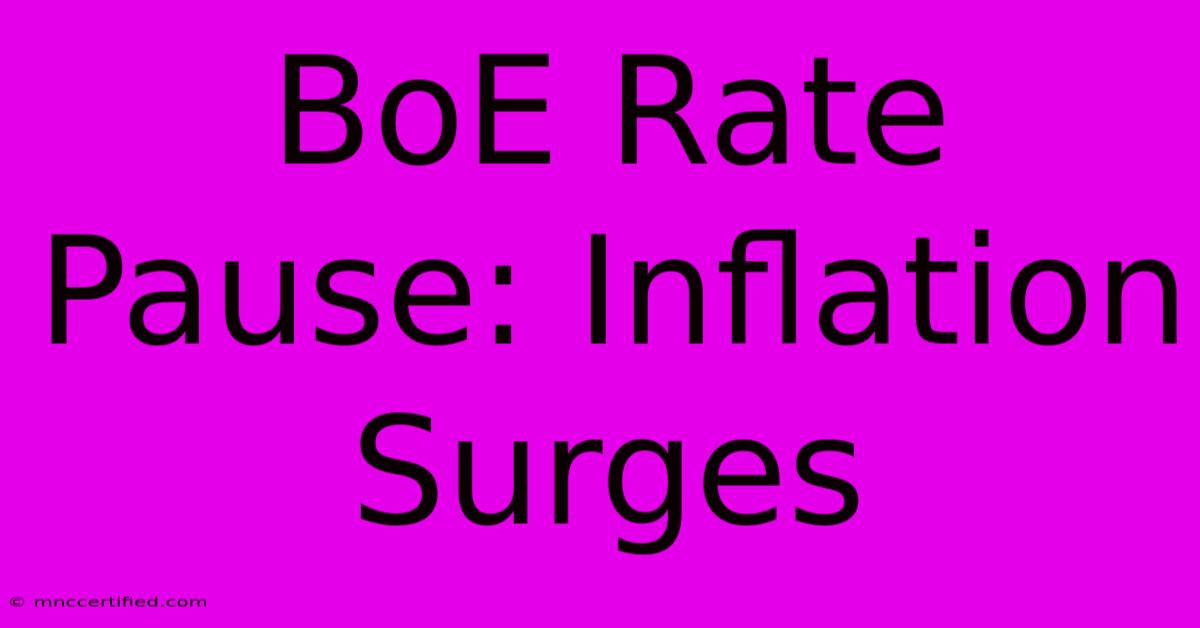BoE Rate Pause: Inflation Surges

Table of Contents
BoE Rate Pause: Inflation Surges - A Deeper Dive into UK Monetary Policy
The Bank of England's (BoE) recent decision to pause its interest rate hikes, despite surging inflation, has sent ripples through the financial markets and sparked intense debate amongst economists. This article delves into the intricacies of this decision, examining the factors contributing to the persistent inflationary pressure and analyzing the potential consequences of the BoE's strategy.
Understanding the Inflationary Pressure
The UK is currently grappling with stubbornly high inflation, a situation significantly impacting household budgets and economic growth. Several factors contribute to this persistent inflationary pressure:
-
Energy Prices: Soaring global energy prices, exacerbated by the ongoing geopolitical instability, remain a major driver of inflation. The UK's reliance on imported energy makes it particularly vulnerable to these fluctuations. This is a key factor influencing the cost of living crisis.
-
Supply Chain Disruptions: The lingering effects of the pandemic continue to disrupt global supply chains, leading to shortages and increased prices for various goods. This contributes to a broad-based inflationary pressure, affecting everything from food to manufactured products.
-
Wage Growth: While wage growth is increasing, it's not keeping pace with inflation. This creates a "wage-price spiral," where rising wages fuel further price increases, perpetuating the inflationary cycle. The BoE carefully monitors wage growth as a critical indicator.
-
Second-round effects: The initial shocks from energy and supply chains have triggered second-round effects, leading to broader price increases across the economy. This makes controlling inflation even more challenging.
The BoE's Rate Pause: A Calculated Risk?
The BoE's decision to pause interest rate increases, despite the persistent high inflation, is a bold and arguably risky move. The rationale behind this decision likely involves a complex interplay of factors:
-
Economic Slowdown: The UK economy is showing signs of slowing down, raising concerns about a potential recession. Further interest rate hikes could exacerbate this slowdown, potentially leading to job losses and a deeper economic downturn.
-
Lagged Effects: Monetary policy operates with a significant lag. The full impact of previous interest rate hikes is yet to be felt, meaning the BoE might be waiting to assess their effectiveness before implementing further increases.
-
Data Dependency: The BoE is likely adopting a data-dependent approach, closely monitoring incoming economic data to gauge the effectiveness of its past actions and to inform future decisions. This cautious approach is understandable given the uncertain economic outlook.
-
Balancing Act: The BoE faces a difficult balancing act between controlling inflation and avoiding a sharp economic contraction. The rate pause reflects an attempt to navigate this delicate balance.
Potential Consequences of the Pause
The BoE's decision is not without potential drawbacks. A prolonged period of high inflation could:
-
Erode purchasing power: High inflation erodes the purchasing power of consumers, reducing their disposable income and potentially leading to decreased consumer spending.
-
Increase borrowing costs: While the rate is paused, borrowing costs remain relatively high, potentially dampening investment and economic growth.
-
Damage investor confidence: Uncertainty surrounding the BoE's strategy could negatively impact investor confidence, potentially leading to capital flight.
Looking Ahead: What to Expect
The coming months will be crucial in determining the effectiveness of the BoE's strategy. Close monitoring of inflation data, economic growth figures, and wage growth will be essential. The BoE will likely reassess its stance based on these indicators, potentially resuming interest rate hikes if inflation remains stubbornly high or resuming cuts should the economy contract further. The UK's economic future hinges on the BoE's ability to effectively manage this complex situation. Further analysis and expert commentary will be essential to fully understanding the long-term impact of this rate pause. The situation remains fluid, requiring constant attention and careful analysis.
Keywords: BoE, Bank of England, interest rates, inflation, UK economy, monetary policy, recession, economic slowdown, cost of living crisis, wage growth, supply chain, energy prices, interest rate hike, rate pause, data dependent, economic outlook.

Thank you for visiting our website wich cover about BoE Rate Pause: Inflation Surges. We hope the information provided has been useful to you. Feel free to contact us if you have any questions or need further assistance. See you next time and dont miss to bookmark.
Featured Posts
-
Small Plane Crash Kills Pilots Near Honolulu
Dec 19, 2024
-
Cdc Confirms Severe Human Bird Flu
Dec 19, 2024
-
2027 Bluey Movie Parent Excitement
Dec 19, 2024
-
Trinity Rodmans Dad
Dec 19, 2024
-
Tory Plea Musk Avoids Reform Uk
Dec 19, 2024